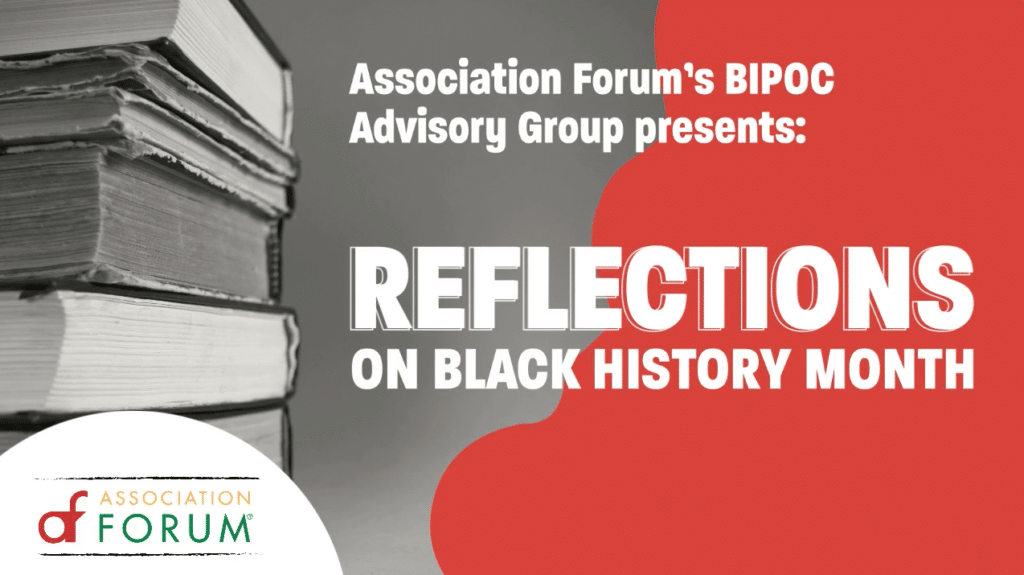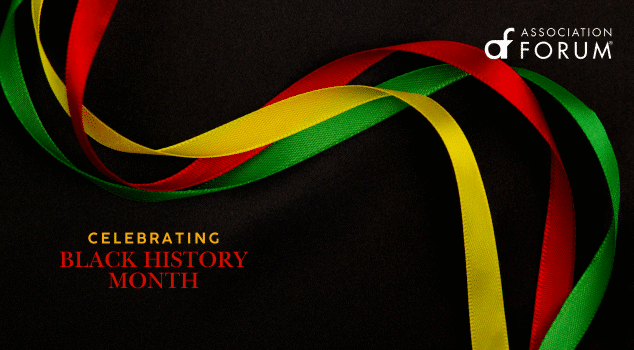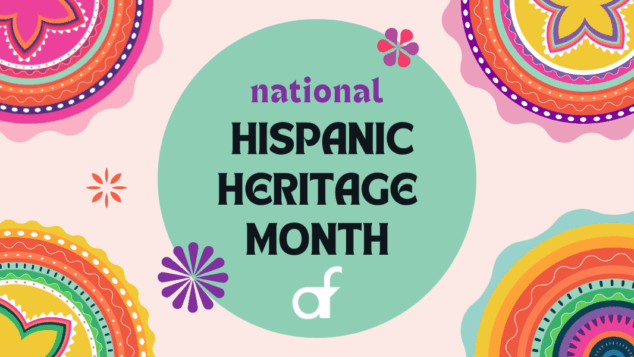Reflections on Black History Month: Desirée Knight

This video is the second in a series for Black History Month. Organized by Association Forum’s BIPOC Advisory Group, this series asks black association leaders to reflect on this month and their role in making history within our industry. In this video, Artesha Moore, President & CEO of Association Forum, sits down with Desirée Knight, the first female of color to be named chair-elect of PCMA. If you prefer to read the transcript, scroll down for the full text.
Video Transcript
Artesha Moore: Hello, everyone. I’m Artesha Moore, President and CEO of Association Forum. And today, here with me, is Desiree Knight. And so I’m going to turn it over to Desiree to introduce herself before we get started.
Desirée Knight: Everyone, my name is Desiree Knight. I am the Senior Director of Education and Meetings for American Railway Engineering Maintenance-of-Way Association. I am also the PCMA chair-elect for this year and the chair for next year.
But before we get started, Artesha, I want to say to you I am so happy for you with your new position. Congratulations and welcome to… I just told Kelly this, welcome to Chicago, my favorite city.
Artesha Moore: Thank you so much. I’m excited to be here and I’ve actually officially moved. So I am ready for the snow that’s coming soon and really ready to get involved in the community.
So, thank you for being with us today. And you’re in some very important roles and I’ve known you for a long time, so I’m going to ask a question that really, for me, is really near and dear. As we come into the middle of Black History month, I thought I would start with: what does Black History month mean to you?
Desirée Knight: Oh my God, Artesha. Let me… I got to give you a little history. So Black History month is the one month that gives me the opportunity to dig into our history. I started a few years ago with a Facebook post where I would post every day a black person that I identified. I would literally get up early in the morning and start my research a few hours before I started work.
So let me give you an example of one person that I found that I thought was very interesting and apropos for Chicago. Did you know that a man by the name of Robert Robinson Taylor, who was born in 1868, was the first black accredited architect and he attended MIT. And I found that interesting because Chicago is known for architecture. And in fact that a black man was actually went to MIT back in 18… in that timeframe is just unheard of. And the other thing that he did was so astounding was he created many of the buildings at Tuskegee Institute. And why is this important? If I was a black, young person wanting to become an architect, it’s important for me to know my history, right? And to see that there are other black individuals that are actually in that field.
Currently, though, I’m reading 1619 Project. And I’ve also tasked my DELP classmates to do the same. And for those that might not know what DELP is, it’s the Diversity Executive Leadership Program that’s housed by as ASAE but is sponsored by Denver, excuse me, by Detroit. I’m halfway reading that book but what I found very interesting is the lack of history that is produced or discussed in high school around black history. I think it’s important that we know where we come from, and based on my history lessons and classes, the only thing that my history class discussed was of course, civil war, the civil rights, and a little bit of slavery.
From that, though, because I realized there’s so much more history that I wanted to know, I became the consummate learner on our history; hence, why I started that Facebook post every February. I think it is… we are still at an opportune time to create change. We’re still fighting for equal rights and getting our footing in workplaces to be treated fairly. I love that there is a one month out of the year that we get to celebrate us, and our history, and where we come from.
Artesha Moore: I think that’s really important. And when you were speaking, I thought of how many times I looked at those posts and learned something that I didn’t know and how important it is. The other part I think in some aspect as what you’ve done, even in The 1619 Project, is to socialize the need to know.
Desirée Knight: Yes.
Artesha Moore: But we are in a day and age where it’s very visual and there’s a lot of first and only. So as I think about Black History month, I think about both the history, but also the present. And so what I’d like to ask you is: what is it like to be the first woman of color in your role at PCMA?
Desirée Knight: Oh my goodness. When I first found out that I was going to be the chair-elect for PCMA, I was out of this world and over the moon. But then I realized it comes with a heavy weight, right? Because we are now dealing with a pandemic that has disturbed our way of living.
I have been in a long time volunteer with PCMA, and because I wanted to be at the forefront of change and possibility, I understand the importance of giving back and volunteering and PCMA for feels that need for me. I work so hard with PCMA and with our industry because I believe in PCCMA’s vision, which is: to transform the world economically and socially.
As we continue to move through this pandemic, though, there is no better time to be part of an industry responsible for global and economic growth. I’m so honored that I was chosen to be the leader for this organization. But I have to tell you, achieving this goal during this pivotal moment, it is astonishing to think about what’s at the forefront of what we’re getting ready to deal with.
I have been successful with breaking this glass ceiling, but I want to ensure that I’m not the last one. Looking at the future of this industry and how it is so disrupted, so much work has to be done. And the most important part is meetings now have to be relevant. It’s no longer, “I’m just going to go to a meeting to get these CAEs and not actually sit in a class.” We need to create an environment where it’s relevant and that people understand the importance of getting together and of collecting those CAEs.
We still have… this industry has, an incredible uphill battle that we’re fighting. And as the leader of this organization, I realize there’s more work to be done in repairing this industry and that this, what’s shattered, was because of COVID. There’s still diversity. There’s still saving our planet. And there’s still an interest of redefining the significance of meetings.
And as we continue to repair, I want to also say that another goal of mine is to ensure that I will not be the last one, the last person of color, to sit in this position. I am… one of my goals, and most important goals, is to make sure that I reach back. And how I’m going to do that is through the young professionals, to ensure that I’m mentoring a group of young professionals, so that they can take this seat when it’s their time.
Artesha Moore: That’s such a powerful action, especially the mentorship part. And I really appreciated your vision. And especially at this time where we all are at crossroads and the pandemic really accelerated the need for us to look at our business models, meetings and collaboration and togetherness is important. And so I appreciate your position at PCMA. But I also appreciate your stance in giving back and pulling others forward, right?
Desirée Knight: Yes.
Artesha Moore: And that mentorship is so important. So my last question for you, because I probably would have so many, but my last question for you as I look at this is: who do you admire or look up to? Like who are your heroes?
Desirée Knight: So it’s so interesting. I have to admit, I saw Jackie’s video as well, Jackie Price Osafo. And she and I have had this conversation before and we have the same view. It’s not anybody you know.
So I was fortunate to be surrounded by four incredible women, two being my grandmothers and two being my mothers. So I have a bonus mother, who was not my birth mother, and then my birth mother. I’m going to talk about my grandmothers for a moment.
So the two grandmothers both were housekeepers. One was a housekeeper for a family, one was a housekeeper for a hotel, which I found kind of interesting considering the industry that I’m in. But the thing that they did so well was they were the CEO of our families. In other words, they ensured, based on their leadership, that our families did exactly what they were supposed to do, which was: to go to church, go get your education, make sure you dress well, and that you spoke well and you represented the family well. Okay. Isn’t that similar to an association?
My mothers… my birth mother, way before her time, raised in the south, moved to Los Angeles. Ended up working for a company that was predominantly white male. Yet she ensured that she was paid fairly and that the other… she was a secretary, and that she received the same amount of salary that her white counterparts received.
My bonus mother worked for a major industry, which we know in Hollywood as television. She was the first black person to lead camera crews, female, in a predominantly male industry. And when it was time for her to fight for her employees and herself, she did just that. She actually took their butts to court.
So my point to all of that is: I had so much guidance and understanding of what leadership looks like at a very early age, based on those four, incredible women. And I owe so much homage to them for leading the way and guiding me, without them even knowing, at an early age. Those are my heroes.
Artesha Moore: That’s so powerful. And I think it resonates with me, as I mentioned with Jackie, being inspired by my family, right?
Desirée Knight: Yes.
Artesha Moore: I will also say I’m deeply inspired by you.
Desirée Knight: Oh.
Artesha Moore: As I’ve watched you, I’m a member of the DELP community, and as I’ve watched your coming in and rise and what you give back, it’s inspiring. So, thank you. Thank you for all you do and how you’re helping shape the next generations of leaders that will come behind you.
Desirée Knight: Thank you, Artesha, for the opportunity. It has been my pleasure.
Tags
Related Articles
BAE Chicagoland Kicks Off: Join the Movement!
Black Association Executives (BAE) is officially in Chicagoland, bringing a bold new community to Black...
25/7/365 Leadership: How to gain an extra hour every day (Without burning out)
Association professionals don’t work in a 9‑to‑5 world, but in a 24/7/365 reality. With high...
Celebrating Hispanic Heritage Month with Association Latinos
How to celebrate Hispanic Heritage Month within the association community and Chicago!






